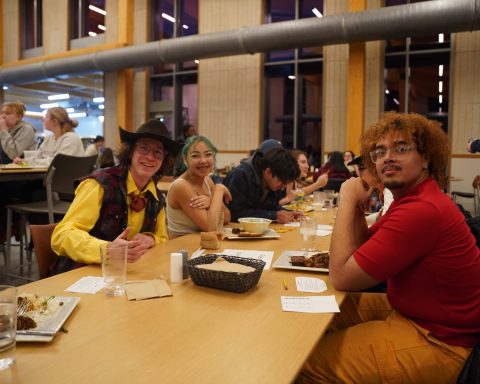On February 24, during the online event entitled “Abolishing the Death Penalty with Sister Helen Prejean: Justice, Dignity, and Faith,” Sister Helen, a leading U.S. advocate for abolishing capital punishment and renowned author of Dead Man Walking: The Eyewitness Account of the Death Penalty That Sparked a National Debate, spoke of her own experiences getting to know incarcerated people.
“If we believe that murder is wrong and not admissible in our society, then it has to be wrong for everyone, not just individuals but governments as well,” wrote Sister Helen in Dead Man Walking. “And I end by challenging people to ask themselves whether we can continue to allow the government, subject as it is to every imaginable form of inefficiency and corruption, to have such power to kill. ”
The online event consisted of an hour-long talk and a Q&A. Sister Helen ended the evening with a proposal for those in attendance, inviting them to join a small group that would read her book and discuss it with her personally.
Sponsored and organized primarily by the Interfaith Center and Petey Greene Program, the event was also supported by the Department of Sociology and Anthropology, Peace and Conflict Studies, and the Urban Inequalities & Incarceration Program at the Lang Center.
Timothy St. Pierre ’21, an intern in the Interfaith Center and the primary event organizer, said that movements for racial justice over the past year such as the Black Lives Matter movement inspired the event.
“After the racial justice protests of this past year, we had been trying to think of ways that the Interfaith Center could contribute to ongoing movements for justice while highlighting faith-based voices within these same movements,” he said.
According to St. Pierre, the event had been in the works since the beginning of the academic year.
“We’d been planning it from the start of the fall semester and had initially hoped to include Sister Helen on a racial justice panel organized by fellow intern Jayna Jones in October, but scheduling conflicts forced us to replan. We decided to instead organize an event around Sister Helen specifically and reached out to people working and volunteering with her ministry, who helped us organize the Zoom event,” said St. Pierre.
During the event, Sister Helen spoke passionately about her abolitionist views on the death penalty. Because the capital decisions of who is sentenced on death row are made by humans and are therefore subjective, she argued, the current sentencing process will forever ensure the impossibility of fair criteria for judgment.
Sister Helen emphasized the deep-rooted racism in the justice system.
“Racism affects [the process of deciding who receives the death penalty] from the beginning to the end of the process,” she said.
She spoke of the death penalty as political currency for prosecutors; many built their reputations by calling for capital punishment. Moreover, she explained how the courts disproportionately gave the death penalty to men of color who were charged with violent crimes, such as the murder of white women.
St. Pierre hoped that attendees would leave the talk with motivation to not rush to judgments about incarcerated people.
“I hope her ministry and model motivate people, whether at Swat or elsewhere, to engage more meaningfully and concretely with justice movements and to consider their existing opinions of incarcerated persons, especially those we might be tempted to view as irredeemable,” he said.
Julia Botkin ’21 attended the event because of her interest in the movie Dead Man Walking, a 1995 adaptation based on Sister Helen’s book, which she saw in high school. She left with a greater understanding of Sister Helen’s advocacy.
“I wanted to attend the talk to learn about [Sister Helen’s] advocacy work related to the death penalty and hear how she first became involved in advocacy work,” Botkin said.
Nora Sweeney ’24 also saw Dead Man Walking in high school and afterward followed Sister Helen’s work.
“I very much enjoyed the event! I’ve been following Sister Helen’s work for a few years now … and one of my mentors has worked with her on restorative justice practices in the past,” Sweeney said. “I was eager to hear directly from her, and I’m very grateful for the chance for the specific conversation.”
Sweeney found that she agreed with Sister Helen’s beliefs about accountability.
“A lot of her messaging is similar to other Catholic tenets of dignity, and I really resonated with working on being answerable and accountable for what we learn how to see and finding personal stake in ending the death penalty,” she said.
Sister Helen’s drive to end the death penalty has made her America’s largest advocate against capital punishment. Through her many books and continuous passion, Sister Helen reaches thousands of people across the country.
Featured image courtesy of Steve Rhodes on Flickr.
















